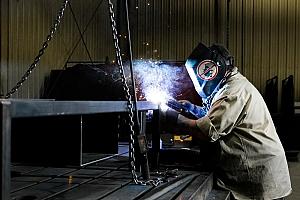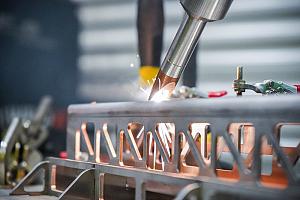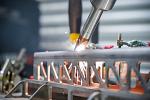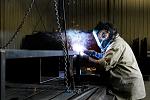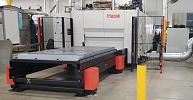Senior Editor
- FMA
- The Fabricator
- FABTECH
- Canadian Metalworking
Categories
- Additive Manufacturing
- Aluminum Welding
- Arc Welding
- Assembly and Joining
- Automation and Robotics
- Bending and Forming
- Consumables
- Cutting and Weld Prep
- Electric Vehicles
- En Español
- Finishing
- Hydroforming
- Laser Cutting
- Laser Welding
- Machining
- Manufacturing Software
- Materials Handling
- Metals/Materials
- Oxyfuel Cutting
- Plasma Cutting
- Power Tools
- Punching and Other Holemaking
- Roll Forming
- Safety
- Sawing
- Shearing
- Shop Management
- Testing and Measuring
- Tube and Pipe Fabrication
- Tube and Pipe Production
- Waterjet Cutting
Industry Directory
Webcasts
Podcasts
FAB 40
Advertise
Subscribe
Account Login
Search
The importance of process innovation
- By Tim Heston
- July 9, 2014
It’s nice to see that manufacturing still getting so much attention in Washington, and this includes the National Network for Manufacturing Innovation. As stated on the government’s website, “Unlike other industrialized countries, the federal government does very little to address the high risk activity of taking fundamental discoveries and inventions and transforming them into manufacturable products.”
I’m all for supporting innovation, creating a bridge between basic research and the world of business—of marketing, selling, and manufacturing. That’s all important stuff.
But I also know that America has some really innovative companies who design some really innovative things, and some get more attention than others. Apple has an entire media ecosystem paying attention to its every move. But when, say, Legrand comes out with a new raceway enclosure for electrical wiring, it doesn’t get so much attention outside electrical distributorships.
It’s not a consumer product, of course, so it’ll never have the marketing “wow” factor of consumer gadgetry. But it can have a real economic wow factor, and that’s because not of Legrand’s product innovation, but its process innovation. Attendees at LeanFab Workshop & Tours, an event organized by the Fabricators & Manufacturers Association, International®, witnessed this process innovation first-hand. After decades of kaizen events, Legrand’s West Hartford, Conn., plant continually finds ways to manufacture more value in less space with fewer resources. In 2013 alone, the plant opened up 10,000 square feet of space, and they filled it all with manufacturing cells that make new product lines. Product innovation made that possible, but so did process innovation, including lean manufacturing.
So much of the national discussion seems to be on inventions and new technology, but all the technology in the world can’t make a business deliver quality products on-time. It’s about manufacturers concentrating on part flow instead of big batches, about shipping a product at the right time, not about churning so many parts per hour out of one work cell. It’s about overall, or global, efficiency, not local efficiency.
The national discussion has focused on getting more kids interested in science and technology—all good things. But I think back to my own education, and a philosophy class on logic comes to mind. The teacher covered the basics of deductive and inductive reasoning, and whenever I go on a plant tour and ask sources questions, I realize I’m using the tools that class gave me.
Manufacturing is a wonderfully logical profession. Workplace politics abound, of course, but the rationality of lean manufacturing continues to make me excited about coming to work in the morning. It’s about finding a better, easer way to make more value in less time.
Product innovation is alive and well in America. We have amazing new products and amazing machine tools to make them with—think lasers, additive manufacturing; the possibilities are mindboggling. But it’s the process innovation that will allow a manufacturing plant to compete with the world, make more things of value with fewer resources, and ultimately become a truly powerful economic engine once again.
subscribe now

The Fabricator is North America's leading magazine for the metal forming and fabricating industry. The magazine delivers the news, technical articles, and case histories that enable fabricators to do their jobs more efficiently. The Fabricator has served the industry since 1970.
start your free subscriptionAbout the Author

Tim Heston
2135 Point Blvd
Elgin, IL 60123
815-381-1314
Tim Heston, The Fabricator's senior editor, has covered the metal fabrication industry since 1998, starting his career at the American Welding Society's Welding Journal. Since then he has covered the full range of metal fabrication processes, from stamping, bending, and cutting to grinding and polishing. He joined The Fabricator's staff in October 2007.
- Stay connected from anywhere

Easily access valuable industry resources now with full access to the digital edition of The Fabricator.

Easily access valuable industry resources now with full access to the digital edition of The Welder.

Easily access valuable industry resources now with full access to the digital edition of The Tube and Pipe Journal.
- Podcasting
- Podcast:
- The Fabricator Podcast
- Published:
- 04/30/2024
- Running Time:
- 53:00
Seth Feldman of Iowa-based Wertzbaugher Services joins The Fabricator Podcast to offer his take as a Gen Zer...
- Industry Events
Pipe and Tube Conference
- May 21 - 22, 2024
- Omaha, NE
World-Class Roll Forming Workshop
- June 5 - 6, 2024
- Louisville, KY
Advanced Laser Application Workshop
- June 25 - 27, 2024
- Novi, MI
Precision Press Brake Certificate Course
- July 31 - August 1, 2024
- Elgin,

